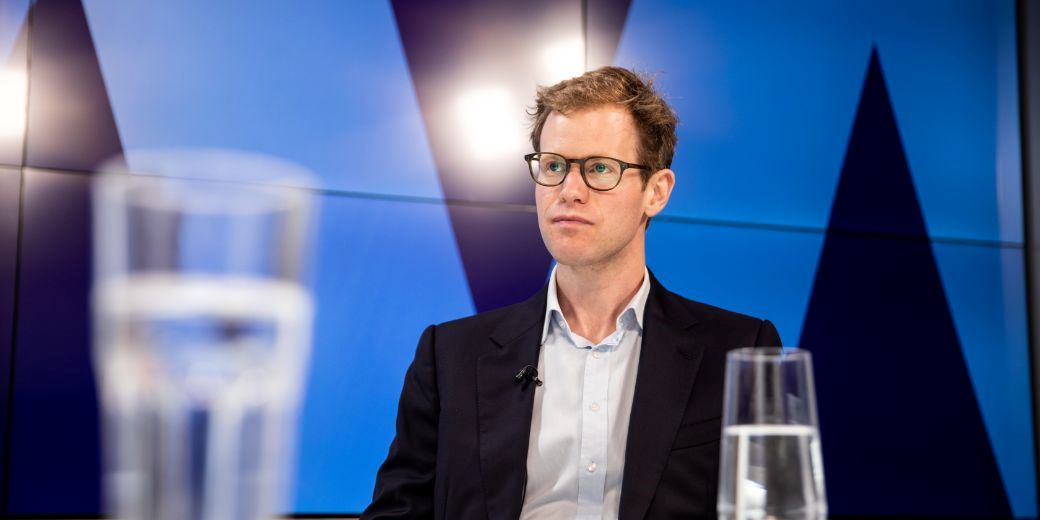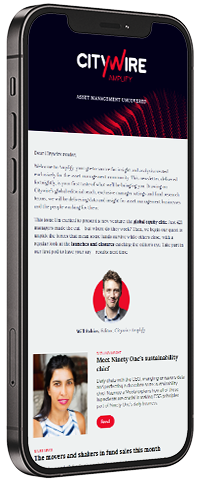There might be light at the end of the tunnel, but it ain’t here yet.
‘We don’t invest in a bad company that might turn good in 20 years’

Latest Newsletter
Value stance rewards managers with first AAA rating
The year comes to a close with a host of managers gaining their AAA wings.
Real Life: A cheaper, smarter way to fly business to the US
Companies are clamping down on travel costs. Here’s how to travel in comfort while keeping the expenses department happy.
Community
Joining in early 2020, George Crowdy has not even had enough time to qualify for a Citywire fund manager rating. But the new blood in Royal London Asset Management’s sustainable investment team has already adopted his company’s investment ethic.
Beginning his career in 2010 as an analyst at Henderson, Crowdy reveals how he progressed in his career to become a sustainable fund manager. Amplify began by asking him about his relationship with the responsible investment team.

George Crowdy: We do all of the sustainable and financial research on investment ideas, but we do have this centralised resource of real subject matter experts, be it on things like corporate governance, climate or engagement. They feed into every one of our research notes in some way, shape or form. We also vote on every company only from a sustainable perspective. Fund managers can’t shoehorn things in. Having this team of other people with an equal vote to us is powerful. A responsible investment team does attract a slightly different person to an investment team, because they’re not on the hook for performance to clients in the same way we are.
You can have someone who can spend their career becoming a real expert in global corporate governance standards. It’s harder to do that on an investment team.
Citywire Amplify: How do you work with Ashley Hamilton Claxton, who heads that team?
George Crowdy: It’s a multiple-times-a-week interaction. She’s got the broader remit of bringing RLAM into the Royal London Group and keeping us at the forefront of responsible and sustainable investment as part of the industry. She’s the one who goes along to all these lobby groups trying to shape the path for sustainable and responsible investment.
Her team, and various members of her team, certainly input a lot into our research processes and active ownership of companies, be it helping us with the proxy voting, or helping us with engagement agendas with management teams and boards.
Citywire Amplify: Both you and the responsible investment team get a vote on stock choices?
George Crowdy: If one of the analysts on our team had a new idea, they would write a ballpark 30-page note on it – split roughly equally between sustainable and financial factors. Sustainable involves looking at what the company does, and how that company’s products and services are helping contribute to a cleaner, healthier, safer and more inclusive society. Focusing on the industry in which it operates, its role within that industry.
There is also a huge focus on how that company operates: how it treats its employees, how it interacts with its supply chain and is raising standards there, its safety track record, how it’s incorporating environmental considerations into its operations, and things like the circular economy – is it a good corporate system; is it a leader in terms of how it manages its operations? That’s the sustainable side. The financial side is somewhat linked to assessing the business model quality and looking at things like valuation.
The note is produced and sent around to a large group of people. It’s put out to vote and people try to conclude: ‘Is this the type of company we should be investing in in the sustainable funds?’ It’s only from a sustainable perspective that that vote is cast. There are puts and takes. There’s no such thing as a perfect company.
But there are companies we have never invested in. Tesla’s a great example. It has fantastically positive products and services, you could argue. But there is a question mark on some of the operations, and there is a huge question mark on the corporate governance. Is that in, is that out? Tesla is out, and that is due to the corporate governance aspects.
We have these different people who can raise the flag and say: ‘I’m not sure about this.’ When that happens, we have this independent external advisory committee. This is [made up of] four people who don’t work for RLAM but are part of the sustainable funds ecosystem. They’re there to help us if we don’t agree on things internally. We get their input and take their views on board. We’ve got some pretty impressive people on that roster – Alex Edmans [professor of finance at London Business School], Ben Yeoh [fund manager, considered to be a thought leader in sustainability], and Tonia Lovell, former general counsel at Unilever who’s hugely experienced in what it’s like to run a business in places like China.
Citywire Amplify: Is there another example of something that didn’t get through the process?
George Crowdy: Nintendo is an interesting one. We’re not particularly interested in the video gaming sector as sustainable investors, but Nintendo is right at the end of family-friendly entertainment. It has done a lot of quite clever things around trying to make people lead healthier and more active lifestyles and it produces activity games. Generally, we would consider it a leader in terms of responsible video gaming, but it was one that we didn’t put through.
That was because of some of its mobile gaming. It does these things called loot boxes. Gamers pay a small amount of money, but they don’t know what they’re getting. Following discussions with our advisory committee, we saw that in the same light as gambling. Someone spends £5 thinking they’re going to get a cool outfit for their character and gets a rubbish one. Then they spend another £5 thinking they’re going to get a good one. It didn’t sit well with us in terms of what a responsible business should be doing.
Citywire Amplify: On fossil fuels, a case that I’ve now heard stated much more recently is that we’ve got to go back to the oil companies because they’re the ones who are going to deliver the global transition.
George Crowdy: The company has to be sustainable today. We don’t want to invest in a bad company today that might be a good company for society in 20 years’ time.
That’s not what our clients are signed up for and what we think sustainable investing should be. So that would prohibit any company that generates the vast majority of its revenues from fossil fuels from entering our world. Fast forward 20 years down the line, these companies may look very different and might be of interest to us. But I would suggest these transitions are going to be very difficult, very complex and very risky in some cases.
There is a completely different skillset between managing a clean and renewable energy company to a fossil fuel-based one. You need a team of engineers, not geologists. I think investors overestimate the ability of companies to do this successfully.
It’s fascinating what’s been happening in the world and COP26 was only last October. All these countries signed up to all these agreements and then the last six months have been the strongest environment for fossil fuel-based energy we’ve seen in a decade.
Some of that is geopolitical. Some of it is a lack of investment over the last few years. But we stand to accelerate the transition away from fossil fuels. One reason is just the economics of wind and solar becoming ever more attractive. The costs of both of those are going down every year because of technological advancements whereas fossil fuel costs are going up at the moment. It’s the only way countries can be in control of their energy supply. We’re going to see a huge amount of investment in this space.

‘I wasn’t facing much competition’: How Crowdy joined ESG’s A-team
‘Sustainable investing wasn’t really a thing when I started. Certainly nowhere near as much as it is now. There were ethical funds and they later pivoted what they were doing.
‘Ethical investing is all about avoiding the bad – fossil fuels, tobacco, defence, gambling, etc – and then investing in what’s left.
‘Sustainable investing is the other side to that. It’s actively investing in companies that are doing good, or aligning their prospects with doing good. That’s what I started out doing on this global equity team. Global sustainability was the one that no one thought was the growth area.
‘When I started in 2010-11, our clients were people who even themselves thought you had to give something up for doing good! But I’d seen various colleagues make mistakes investing in tobacco companies and fossil fuel companies. These melting iceberg investments were incredibly hard to get right. Investing in companies with tailwinds was a much easier way to make good investment returns.
‘Working long days doing something that I was genuinely interested in and building a knowledge base in companies that you could hopefully own for a very long time – that really appealed.
‘I wasn’t facing a huge amount of competition for roles in this space, to be honest!
‘I had been steadily building a performance and investment track record. Then the opportunity came to work with Mike [Fox] on the RLAM team. There was a huge opportunity to take it to the next level. Nearly all of the clients were UK-based. The franchise itself was very UK equity-focused, so I was brought in to become more global equity-oriented.
‘Mike had been investing globally since 2009 anyway, but not running a 100% global equity fund. It was more a case of leveraging what he’d been doing. It’s fair to say we were early to sustainable investing but late to global equity at RLAM.’
Latest Newsletter
Amplify Issue 30: The fund groups topping the tree
We analyse which groups have had the biggest inflows and outflows in 2022, look at managers achieving their first AAA ratings, and hear from Rob Kyprianou on why regulation gets it back to front.
Amplify Issue 29: Red hot: 2022’s private market hiring spree
2022 has been a hot year for private markets, but are asset managers putting the brakes on their expansion efforts? Plus, we look at how the bear market has affected launches this year and look at how firms can better communicate their brand values.
Amplify Issue 28: Fill your ESG product gaps
We hear from fund buyers on what they’re looking for from an ESG fund, find out what Neuberger Berman is plotting in the alts world, and learn the winners of Citywire’s Gender Diversity Awards.
Community
